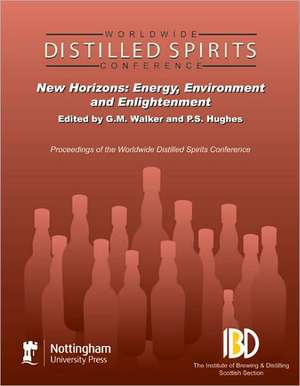Distilled Spirits
en Limba Engleză Mixed media product – 30 sep 2010
Preț: 508.23 lei
Preț vechi: 597.92 lei
-15% Nou
Puncte Express: 762
Preț estimativ în valută:
97.26€ • 100.93$ • 81.29£
97.26€ • 100.93$ • 81.29£
Carte indisponibilă temporar
Doresc să fiu notificat când acest titlu va fi disponibil:
Se trimite...
Preluare comenzi: 021 569.72.76
Specificații
ISBN-13: 9781907284458
ISBN-10: 1907284451
Pagini: 311
Dimensiuni: 216 x 282 x 23 mm
Greutate: 1.13 kg
Editura: Nottingham University Press
ISBN-10: 1907284451
Pagini: 311
Dimensiuni: 216 x 282 x 23 mm
Greutate: 1.13 kg
Editura: Nottingham University Press
Notă biografică
Professor Graeme Walker acts as consultant for international companies involved in producing the next generation of biofuels. He is a staff member in the Division of Biotechnology and Forensic Sciences at Abertay University in Dundee, Scotland Paul Hughes: Originally from Industry, Paul's research efforts over the past six years have focused on the specific strategic issues of product quality, safety and integrity. Additionally he has developed a strong interest in innovation management. His research focus, which falls into four areas, reflects those interest. These four areas are: Biological activity and physicochemical properties of hop acids Perceptions of beer and food quality safety and integrity of all foods and beverages Relationship between business success and innovation
Cuprins
Sugar cane for potable and fuel alcohol * Going against the grain: food versus fuel uses of cereals * Advanced enzymatic pre-treatment for high gravity fermentation * Growing sustainability in the wheat supply chain * Genetics of barley quality * Mobilisation of energy reserves in barley grains following imbibition of water * Effects of lactic acid bacteria on the sensor characteristics of new-make Scotch whisky * Developments in vodka production * Use of terpene-producing yeast in brandy production * Management of yeast issues in Cognac region * Tequila: a peculiar spirit from a peculiar source * The microbiology of rum production * Potential of Blaquilla pear variety to produce pear spirits: influence of the raw material on the final quality of the spirits * Distillers yeast: Discussion forum * New build distilleries - challenges of sustainability * Anaerobic treatment of distillery and brewery wastewaters * Anearobic treatment and biogas production from stillage at a bourbon whisky distillery: a full scale project profile of a sustainable alternative for stillage management * Effective treatment of distillery waste water using MBR technology * Process developments for distillery co-products * Biological treatment of distilled effluents comprising anaerobic processes * Distiller's spent grains: a substrate for bioethanol? * Energy savings using online multivariate distillation monitoring * Fuzzy logic in the distillation process * Cachaca production through double distillation technique * Noise, vibration and lighting in the workplace * Bioremediation of copper from distillery wastewater using indigenous microbes * Benefits of enzymatic pre-treatment of intact yeast cells for anaerobic digestion of distillery pot ale * The microbiology and biotechnology of rum production * Installation and use of an environmentally controlled experimental maturation facility * Emerging ingredients - adding newer dimensions to alcoholic beverages * The new American craft distiller * Renaissance of malt distilling in Tasmania * Structure of ethanol-water systems and its consequence for flavour * Influence of wood species of cask on matured whisky aroma - the identification of a unique character imparted by casks of Japanese oak * New highly aromatic products and distillates from smoked malt * Reactive oxygen scavenging activity of whisky * 2-Acetyl-1-pyrroline, a contributor to cereal and feinty aromas in Scotch whisky * The role of water composition on malt spirit character * Characteristics of the production and flavour of sweet potato shochu * Alcohol and cardiovascular health * Scotch Whisky - opportunities and threats * Tradition and authenticity: where marketing and production meet * Index
